
Gary Anthony James Webb, known professionally as Gary Numan, is an English musician. He entered the music industry as frontman of the new wave band Tubeway Army. After releasing two studio albums with the band, he released his debut solo studio album The Pleasure Principle in 1979, topping the UK Albums Chart. His commercial popularity peaked in the late 1970s and early 1980s with hits including "Are 'Friends' Electric?" and "Cars". Numan maintains a cult following. He has sold over 10 million records.
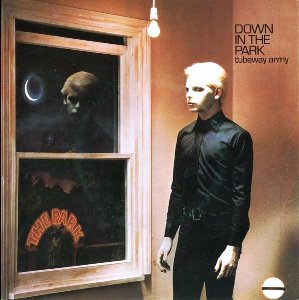
"Down in the Park" is a 1979 song by the English band Tubeway Army, featuring lead vocals by Gary Numan. It was released as the first single from the band's second album Replicas, though was not a hit. The song was written and produced by the band's frontman Gary Numan, and despite its lack of commercial success, has been performed by Numan regularly in his live shows throughout the years.

Replicas is the second and final studio album by the English new wave band Tubeway Army, released on 4 April 1979 by Beggars Banquet Records. It followed their self-titled debut from the previous year. After this, Tubeway Army frontman Gary Numan would continue to release records under his own name, though the musicians in Tubeway Army would continue to work with him for some time. Replicas was the first album of what Numan later termed the "machine" phase of his career, preceding The Pleasure Principle (1979) and Telekon (1980), a collection linked by common themes of a dystopian science fiction future and transmutation of man/machine, coupled with an androgynous image and a synthetic rock sound.

"We Are Glass" is a song by the British singer Gary Numan. It was released as a single in May 1980 and reached number five on the UK Singles Chart.
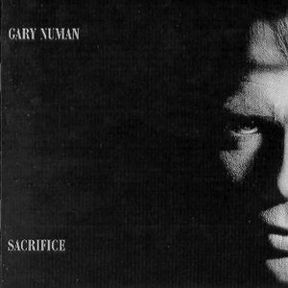
Sacrifice is the twelfth solo studio album by English musician Gary Numan, released in October 1994 by Numa Records. Its release is often cited as marking the start of a critical and artistic rejuvenation for Numan. The album was released in the US in 1997 with a different title, Dawn, based on the comic book character Dawn. It also carried cover art by Joseph Michael Linsner.

"I Die: You Die" is a song by the British musician Gary Numan, released as a single in August 1980. Released shortly before his fourth album, Telekon, it continued the anthemic style Numan had begun earlier in the year with "We Are Glass". The composer himself described the two singles as "Much the same thing. Both very chorus-orientated with the guitars as the main rhythmic device and the keyboards tinkling over the top".

"Stormtrooper in Drag" is the debut single by Paul Gardiner, who was the bass player in Gary Numan's backing band. Numan is featured on the single as a co-composer, producer, musician and vocalist.

I, Assassin is the fourth solo studio album by the English new wave musician Gary Numan, released on 10 September 1982 by Beggars Banquet. It peaked at No. 8 on the UK Album Chart. Three singles were released from the album: "Music for Chameleons", "We Take Mystery " and "White Boys and Heroes", all of which reached the UK Top 20.
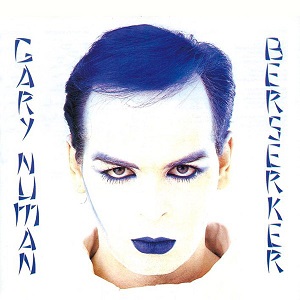
Berserker is the sixth solo studio album by the English new wave musician Gary Numan, released on 9 November 1984, it was his first album to be released under Numan's own record label, Numa Records.

Warriors is the fifth solo studio album by the English new wave musician Gary Numan, released on 16 September 1983 by Beggars Banquet Records, it would be his last studio release on that label.

The Fury is the seventh solo studio album by the English musician Gary Numan, originally released in September 1985, it was Numan's second release on his self-owned Numa Records label. It saw him continuing to explore the sample-heavy industrial sound that he had developed for his previous album Berserker in 1984.
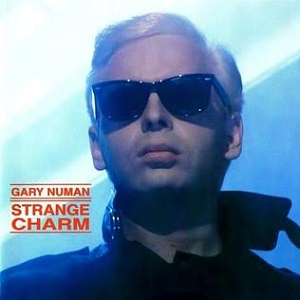
Strange Charm is the eighth solo studio album by the English musician Gary Numan, originally released in November 1986, it was Numan's third release on his self-owned Numa Records label. The album was not released in the United States until 1999 when it was issued in a digitally remastered form with five bonus tracks by Cleopatra Records. In the same year it was also reissued with bonus tracks in the United Kingdom by Eagle Records.

Machine + Soul is the eleventh solo studio album by the English musician Gary Numan, released in 1992. It was a low point, released primarily to help pay off debt, and was the last of his efforts to make his music more radio-friendly. His subsequent work went in the much darker and more industrial direction that would revive his career.

Automatic is a 1989 album released by Sharpe & Numan.
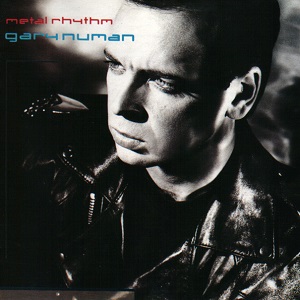
Metal Rhythm is the ninth solo studio album by the English musician Gary Numan, released in September 1988 by I.R.S. Records.
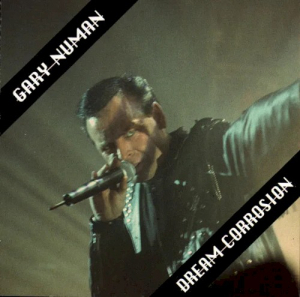
Dream Corrosion is a 1994 live album by the British electronic musician Gary Numan. It was recorded at the London Hammersmith Apollo on 6 November 1993, and was originally released under the Numa Records label.
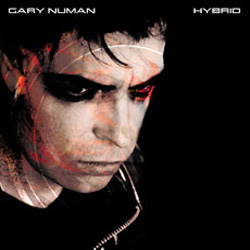
Hybrid is a remix/cover album, consisting of songs by Gary Numan remixed by other artists, covers of Numan's early songs from his first three albums, plus three new tracks created specifically for the album. Hybrid was recorded in autumn of 2002 and released in March 2003 with a collaboration from various industrial rock/heavy rock musicians such as Rico, Sulpher and Alan Moulder. The album includes tracks originally found on the albums Tubeway Army, Replicas, The Pleasure Principle, Telekon, Sacrifice, Exile and Pure.

Jagged is the fifteenth solo studio album by English musician Gary Numan, his first original album in over five years, following Pure in 2000. Stylistically Jagged was a development of its predecessor's chorus-driven, anthemic industrial sound, utilising heavier electronics and more prominent live drumming. Although reaction to the new record was predominantly positive, critical opinion was more heavily divided than had been the case with the almost universal praise enjoyed by Pure. Reaching number 59 in the UK album charts, Jagged charted no higher than the earlier release, some commentators and fans regarding the long time between albums as a missed opportunity for consolidation in the wake of Pure's reception and the number 13 UK chart position attained by Numan's 2003 single with Rico, "Crazier". Jagged was the first album issued on Numan's own Mortal Records label, licensed to Cooking Vinyl. The US release, on Metropolis Records, included an alternate mix of "Fold" as a bonus track. In April Numan embarked on a tour of the UK, Europe and North America to promote the album.
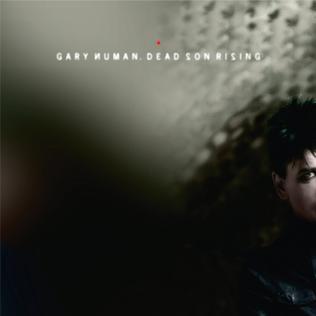
Dead Son Rising is the sixteenth solo studio album by English musician Gary Numan, released on 15 September 2011 by Mortal Records.
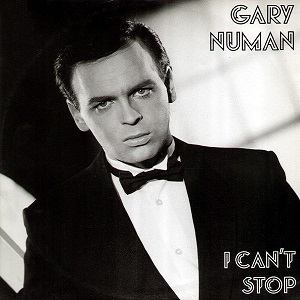
"I Can't Stop" is a song by English musician Gary Numan, which was released in 1986 as the second single from his eighth studio album Strange Charm. It was written by Numan, and produced by Numan and the Waveteam. "I Can't Stop" reached No. 27 in the UK and remained on the charts for four weeks.




















